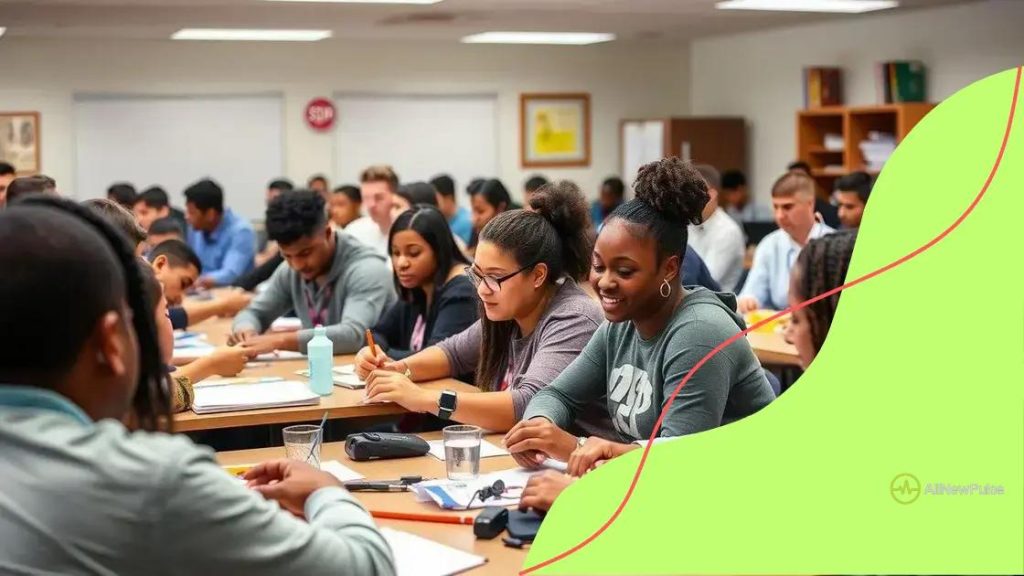The role of community colleges in workforce development

The role of community colleges in workforce development is to provide accessible education and skills training that align with local job market needs, preparing students for successful careers.
The role of community colleges in workforce development is more important than ever. These institutions not only provide education but also shape the skills of the future workforce. How do they achieve this? Let’s dive in and discover their impact on local economies.
Understanding the mission of community colleges
Understanding the mission of community colleges is vital for grasping their role in education and workforce development. These institutions aim to provide accessible education and training to all students, regardless of their background. Through a combination of academic programs and vocational training, community colleges serve as a bridge for many individuals seeking better career opportunities.
Key Objectives of Community Colleges
Community colleges focus on several core objectives that drive their mission:
- Access to Education: They aim to eliminate barriers, allowing a diverse range of students to pursue higher education.
- Workforce Preparedness: Colleges align their programs with local job market needs, offering hands-on training.
- Affordability: By providing lower tuition costs, they make education financially accessible for many.
- Community Engagement: These colleges often foster connections within their localities, promoting social and economic growth.
The impact of community colleges extends beyond the classroom. They play a significant role in transforming lives by providing skills and knowledge necessary for the workforce. Many students find that these colleges offer not only a path to higher education but also certification programs that prepare them for immediate employment.
In addition, partnerships with local businesses enhance their mission. By collaborating with employers, community colleges ensure that their training programs meet the evolving needs of the industry. This adaptability is crucial for students as it aligns their education with job market demands, ultimately leading to better employment outcomes.
Therefore, community colleges are more than just educational institutions; they are crucial players in the overall framework of job training and economic improvement in our communities. As they continue to evolve, their role in workforce development will remain indispensable.
Key programs promoting skills development
Community colleges offer several key programs that promote skills development among students. These programs are designed to equip learners with the competencies needed in today’s job market. By aligning their offerings with industry needs, colleges help students gain valuable, practical skills.
Types of Skills Development Programs
There are various types of programs available that serve distinct needs:
- Certificate Programs: These provide specific skills in short durations, helping students enter the workforce quickly.
- Workforce Training: Customized training programs are often developed in partnership with local businesses to ensure students learn the most relevant skills.
- Apprenticeships: Many community colleges offer apprenticeship programs that allow students to gain hands-on experience while working alongside professionals.
- Continuing Education: This option is for individuals looking to update their skills or learn new ones, often tailored for working adults.
The focus on workforce readiness is vital. Community colleges often conduct surveys to understand employer needs, adjusting their curricula to ensure graduates are job-ready. This responsive approach helps students not only acquire knowledge but also develop critical soft skills like communication and teamwork.
Some colleges even integrate technology into their programs, allowing students to learn modern techniques in fields like healthcare, information technology, and manufacturing. This not only enhances their learning experience but also prepares them for the challenges of a tech-driven workforce.
It’s important to recognize that these programs benefit the community as a whole. By developing a skilled workforce, community colleges contribute to local economies, reducing unemployment rates and fostering business growth.
Partnerships between colleges and local businesses

Partnerships between community colleges and local businesses play a crucial role in enhancing workforce development. These collaborations create a bridge that connects education with real-world job opportunities. By working together, colleges and businesses ensure that students gain relevant skills that meet the demands of the local job market.
Why Partnerships Matter
These partnerships are beneficial for several reasons:
- Curriculum Alignment: Colleges can tailor their programs based on feedback from local employers, ensuring students learn the skills that are in demand.
- Internship Opportunities: Businesses often provide internships that allow students to gain hands-on experience, which is invaluable when entering the workforce.
- Job Placement Rates: When colleges collaborate with businesses, graduates often have higher job placement rates, as employers prefer candidates who have relevant experience.
- Resource Sharing: Colleges may gain access to industry-standard tools and technology, enhancing students’ learning environments.
Additionally, businesses benefit from these relationships. By investing in a skilled workforce, they create a pipeline of qualified candidates for future job openings. This not only helps businesses thrive but also contributes to the overall economic health of the community.
Moreover, colleges often host job fairs and networking events that bring students and businesses together. These activities provide opportunities for students to meet potential employers, learn about job openings, and develop their professional networks.
Through innovative programs and partnerships, community colleges are proving to be essential players in the landscape of workforce development. As they continue to strengthen ties with local businesses, their impact on improving educational outcomes and job readiness will only grow.
Success stories of community college graduates
Success stories of community college graduates highlight the transformative power of education in shaping lives and careers. Many students come to community colleges seeking a second chance or a new direction. Through dedication and hard work, they often achieve remarkable outcomes.
Inspirational Graduates
Graduates from community colleges have gone on to excel in various fields. Here are some notable success stories:
- Healthcare Professionals: Many graduates have entered the healthcare sector as nurses or medical technicians. Their training at community colleges prepared them for demanding roles in hospitals and clinics.
- Entrepreneurs: Some students have used their skills to start their own businesses, becoming successful entrepreneurs in their communities.
- Technology Experts: With the tech industry growing rapidly, numerous graduates have found jobs as IT specialists or software developers, contributing to innovative projects.
- Social Workers: Community college graduates also become advocates for social change. They engage in social work, helping underserved populations access vital services.
These stories are not just about individual achievement; they reflect the role of community colleges in changing the landscape of workforce development. The emphasis on real-world skills and hands-on training equips students with the tools they need to succeed.
Additionally, many community colleges support their students through mentorship programs and job placement services, which enhance their chances of success. This support system can make all the difference for graduates as they navigate their careers.
Overall, the success stories of community college graduates serve as a testament to the impact of education. They show how determination and the right educational opportunities can lead to fulfilling careers and a better quality of life.
The future outlook for workforce training
The future outlook for workforce training is bright and full of possibilities. As industries evolve, the demand for skilled workers continues to grow. Community colleges play a vital role in preparing students for these changes, ensuring they have the necessary skills to succeed in various fields.
Emerging Trends in Workforce Training
Several trends are shaping the future of workforce education:
- Increased Use of Technology: Online learning and virtual simulations are becoming more common. This approach allows students to gain hands-on experience from anywhere, making education more accessible.
- Focus on Soft Skills: Employers value soft skills, such as communication and teamwork. Training programs are beginning to emphasize these skills alongside technical training.
- Industry Partnerships: Collaborations between community colleges and businesses are expanding. These partnerships ensure that training programs remain relevant and meet employer needs.
- Customized Training: Tailored programs designed to meet the specific demands of local industries are on the rise. This enables students to gain the exact skills needed for their future jobs.
As the workforce evolves, so do the methods of training. Community colleges are adapting their approaches to provide the best education possible. This adaptability is crucial in a rapidly changing job market.
In addition, the emphasis on lifelong learning is increasing as industries experience rapid technological advancements. Workers may need to update their skills continuously to keep up with new developments. Community colleges are well-positioned to offer short courses and certifications to help professionals stay competitive.
The investment in workforce training not only benefits individuals; it also strengthens the economy as a whole. By ensuring a skilled workforce, communities can attract businesses and enhance overall growth.
FAQ – Frequently Asked Questions about Community Colleges and Workforce Development
What is the role of community colleges in workforce development?
Community colleges provide education and training that align with local job market needs, ensuring students acquire relevant skills for employment.
How do partnerships with local businesses enhance education?
Partnerships allow colleges to tailor programs based on employer feedback, offer internships, and improve job placement rates for graduates.
What types of programs do community colleges offer for skills development?
They offer a variety of programs, including certificate courses, vocational training, apprenticeships, and continuing education opportunities.
How can students benefit from success stories of graduates?
Success stories inspire current students and highlight the potential outcomes of education at community colleges, showcasing real-life examples of career achievements.





